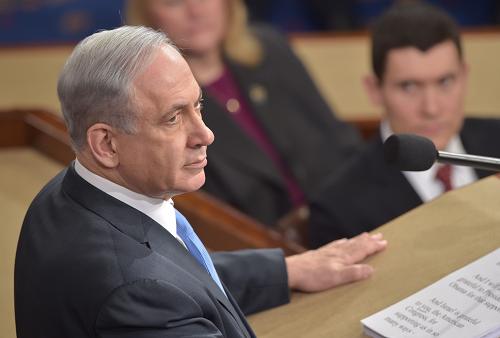What Netanyahu doesn't understand about negotiation
- By Mitchell Blatt
 0 Comment(s)
0 Comment(s) Print
Print E-mail China.org.cn, March 4, 2015
E-mail China.org.cn, March 4, 2015
When I saw a wooden comb on sale for 50 yuan at a historic mansion-turned-museum in Nanjing, I asked for it for 30 yuan. The craftsman who made it wouldn't budge. I wanted the comb for my girlfriend, and I thought 50 yuan was a reasonable price, but I couldn't leave without getting something out of the negotiations.
"Give me some face," I said. "47?" "47 doesn't give me face." Finally we settled on 45 yuan.
Mine was a negotiation over less than US$1. Currently the five permanent members of the UN Security Council and Germany are negotiating with Iran over its nuclear program, which could destabilize the Middle East. The stakes are incomparable, but the principles of negotiation are the same. What the woodworker who sold me his comb understood that Israeli Prime Minister Benjamin Netanyahu doesn't understand is that everyone needs to leave a negotiation feeling like they won.
There were two cameramen from Jiangsu Educational TV watching me; the 80 million people of Iran are watching their government.
|
|
|
Israeli Prime Minister Benjamin Netanyahu addresses a joint meeting of the US Congress at the Capitol in Washington, DC, on March 3, 2015. [Xinhua photo] |
Netanyahu spoke to the U.S. Congress on March 3 to criticize the potential P5+1 deal on the grounds that it concedes too much to Iran. The deal will only last for a decade, Netanyahu claimed. It will recognize an Iranian "right" to enrich uranium. Netanyahu has previously said he wants Iran to forgo its enrichment program completely.
The Obama administration has heard these arguments before. While boycotting Netanyahu's speech and refusing to meet with him, it did get its response out one day before at the AIPAC conference with a speech by National Security Advisor Susan Rice.
To those who insist on zero enrichment, Rice said, "We cannot let a totally unachievable ideal stand in the way of a good deal."
Netanyahu and his Republican allies in Congress, some of whom who have, along with a few Democrats, introduced new sanctions bills, seem to have forgotten that it takes two sides to make a deal. For the countries involved, especially Israel and the United States, certainly it would be better if Iran stopped its nuclear program outright, but Iran would never agree to that, and neither would that be possible through sanctions or military strikes.
Unlike buying a comb, if you walk away without a deal here, there may be real consequences. After all, Netanyahu spent most of his speech hyping the threats presented by Iran. A nuclear-armed Iran would have greater leverage over the entire Middle East. It might spur a nuclear arms race. Saudi Arabia is concerned about Iran's nuclear program, and the two countries are competing furiously for influence in places like Syria and Yemen.
If Congress were to pass a new sanctions bill even as Iran is negotiating, Iran might think the United States will never lift sanctions. Why not keep enriching uranium? If the United States insists on overly stringent conditions, Iran won't be able to accept it and maintain the support of its citizens. Iranian President Hassan Rouhani already faces criticism from hard-line conservatives, including from members of the Iranian Revolutionary Guard. Rouhani accused his critics in January of "cheering on the rival team" and "sabotag[ing]" national interests in favor of partisan politics.
All this isn't to say that a bad deal should be accepted. Some of the same consequences could arise from a bad deal, especially if other countries think they too should have a "right" to enrich uranium.
If the P5+1 countries negotiate in good faith, and Iran doesn't agree to reasonable concessions, then Iran will take the bulk of the blame. "If the Iranians walk away from a deal, Congress will pass more sanctions immediately, and President Obama would support them," Rice said.
But that requires continuing the negotiations and waiting to see the content of a deal before rejecting it. These calls to reject a deal before any deal has been proposed will not get the world closer to a good deal.
If the shop owner had insisted on the original price he offered me, I would have walked away. If Iran doesn't agree to some important concessions – Obama argued for a ten year or longer freeze on March 2 – then the United States and the other P5 counties should by all means walk away. Walking away is another useful tactic in Chinese bargaining when used appropriately.
But neither should the United States stubbornly stick to demands for its ideal price and lose out on what they are after.
The author is a columnist with China.org.cn. For more information please visit: http://www.china.org.cn/opinion/MitchellBlatt.htm
Opinion articles reflect the views of their authors, not necessarily those of China.org.cn.







Go to Forum >>0 Comment(s)